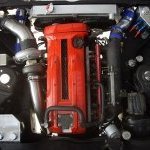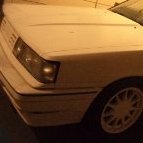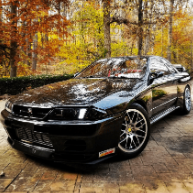Skyline Big Brake Kits Pictured
Announcements
-
Similar Content
-
Latest Posts
-
By GoHashiriya · Posted
Actually, that's not entirely true. It's also the same motor in the 1st gen Nissan Cube but they're rare as hen's teeth. -
Yeah it is always worth testing and balancing actuators out of the box, just set the pressure regulator on a compressor very low (eg 5 psi) and increase it slowly to see when they both move.....unfortunately while you may be able to adjust the length of the actuator rod to minimise any difference, the actual pressure they move from is not adjustable so you need a well matched pair. And yes, the VCAM is probably contributing; the earlier in the rev range they come on boost and the slower the revs build (I think your demo was in 5th), the more you notice it. Driving at WOT through 1st, 2nd, 3rd etc you will probably never hear it as any shuffling starts and is over super quickly
-
By Dose Pipe Sutututu · Posted
oh they were with that motor, you need to remove the engine to change the spark plugs (don't have to, but it does make it easier) -
By nouveau_poor · Posted
I certainly fall into the annoyed camp, but glad to hear that if it's happening at low boost then I'm not likely going to blow a turbo and end up with metal shards in my oil. Just feels like it prevents me from really driving it without hesitation and "peak" performance. Wonder if it's the VCAM, it did an impressive job of shifting the torque curve and faster spool, but maybe now it's "too fast" and there's too much air for how open the throttle is. Based on some other threads, will also do some reading on synchronizing the actuators. They are the default actuators that come on the Garrett's and I would think they would be set the same coming from the factory, but if the turbos don't actually work exactly the same way at the same time as previously mentioned, it would be worth making sure the actuators are actuating together properly -
By GoHashiriya · Posted
I went down this rabbit hole before, ended up sourcing a motor from the UK (I'm in Japan) which also didn't function correctly. With the original motor, I disassembled it and reassembled it and it works somewhat, sometimes. What I could deduce from all my screwing around is that there is calibration of the gears on the inside of the motor and two ramps on the main gear which activate switches that operate the motor and move the sunroof either to retract into the roof or tilt. Where I got stuck was that, it seemed in my case that one or both of the switches that are activated by the ramp on the gear did not always activate and thus the motor did not move, causing it to sometimes not retract or tilt (apologies, I've forgotten which way it didn't work.). Of course this part is discontinued at Nissan now, it's the same part in the S15 but no other models. I also contacted the manufacturer of the component for schematics - forgot the name, they're based in Gifu - but they declined to share the information due to being bound by an NDA, sadly. Looking through my pictures now, it seems I last had a crack at this in 2022. See, I so kindly wrote "open" and "close" next to the switches. If you figure it out, please do tell me. Those little switches, with the red buttons may need to be replaced.
-









Recommended Posts
Create an account or sign in to comment
You need to be a member in order to leave a comment
Create an account
Sign up for a new account in our community. It's easy!
Register a new accountSign in
Already have an account? Sign in here.
Sign In Now